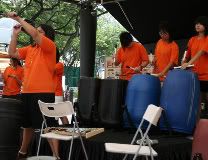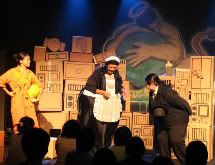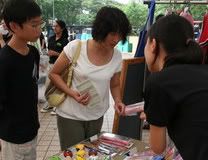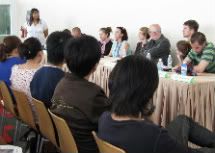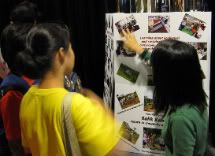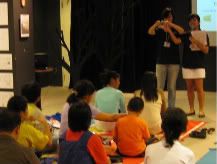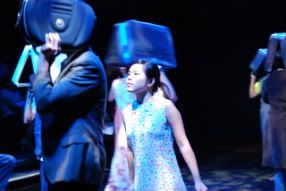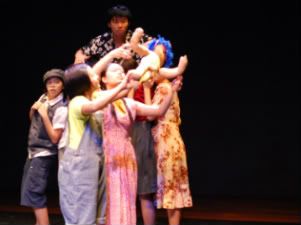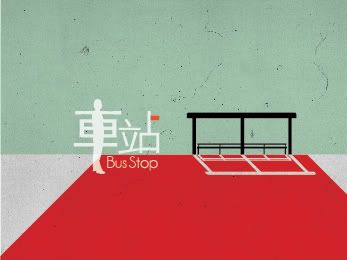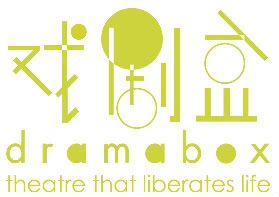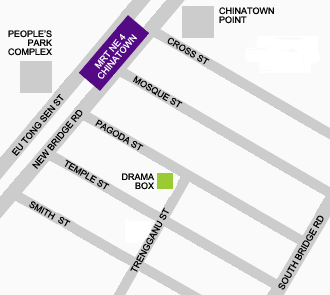The world's a stage...
I'm in the latecomer's queue.
I am currently an undergrad in NTU. My major is psychology and the most common question asked when I reveal that fact is whether I can read his/her mind. Honestly, I cannot lah. Currently, I am daydreaming about my future hoping to achieve 2 things i enjoy alot in life: Theatre and Psychology (:
Studying Accountancy in NTU and living a second life in theatre, where (fortunately) the former will end in 2012 May. Believes that there is a connection between numbers and the arts, or maybe, I am just living in denial all the time.
Law student.
Currently experiencing "quarter-life" crisis.
Aspiring Rapunzel.
Carries an overwhelming amount of passion for an overwhelming number of things, coping with the limited amount of time.
Struggling against a degenerating capacity to remember, and aging year by year.
Like anybody else.
An undergrad at NUS.
Coming out with this line is harder than any paper I've ever written.
Some people say that I look like an ah-lian when I’m quiet and sounds like an auntie when I speak.
I embrace all these comments and aspire to be an elegant ah-lian and intelligent auntie!
Graduated from “The Brainforest of Clementi” with an Honours degree in Life Sciences. As I am currently learning to write and direct plays properly, I do not have any work that is worthy of mention as yet.
Sometimes we need to be crazy, to be human.
I started doing Theatre thinking that I want to do Film.
Now I'm studying Film determined to do Theatre.
Funny yea?
2010年4月22日
第6堂课 Lesson 6 - Image theatre
他/她真的是这样的人还是.....?
这个星期我们主要做的是character work! 要能够诠释一个人物就得先了解那个人物。这得从分析剧本开始。读完了剧本我们可能很轻易地对人物进行价值判断,觉得他/她怎样怎样....但那个人物真的是这样吗?因为我们很可能在剧本中看到别的人物与自己所饰演的人物的对话和相处所以有时候会不经意地将别人对他/她的看法等同于那个人物的个性。如果是这样,我们所饰演的人物就找不到自己了。所以要了解自己所饰演的人物可以先做几个重要的功课。
做出人物的Biodata!我们得从剧本里找出人物的资料而不是凭空想像 =)
海彬和健僮将剧本找到的资料记录下来
海彬和健僮:“父亲没有工作...酗酒...他和妻子还有一个女儿一起住.......
有了基本资料我们才能进一步问自己几个问题:
1. 人物怎么看待自己,他/她对自己得想法。这个问题看起来简单但人物对自己的看法和别人对他/她的看法之间的一条线其实是很模糊的。
2. 人物对他/她身边的人的想法,觉得他们怎么样?
3. 剧中的其他人物怎么看待看待我们所饰演的人物?

关于母亲...母亲觉得女儿怎么样?
母亲觉得丈夫怎么样?
我们都是“跟踪狂”?!!
做完这些功课之后,我们便走到街上当“跟踪狂”!没有啦,其实我们是到大街上去寻找我们饰演的人物,观察我们生活中的人物。通过我们对剧中人物的初步了解去寻找接近这个人物的形像。可以是一个人的发型,衣服又或是一个人吃饭,走路或讲话的样子。看到适合的人我们便拍下照片=) 这些照片只共我们自己参考,纯属教育用途,在这里就不公开了!不过大家不妨多观察周围的人事物,你会发现很多有趣的事哦=)
如果生活也是剧本...
其实面对生活中的人,我们也常轻易地对号入座,把别人对另一个人的想法误看成那个人就是那样,缺少了对那个人的理解。或许把生活当成剧本,在尝试了解自己的当而也试着更用心去认识身边的人吧!
We did character work this week! I was rather inspired by the whole session, partly because I had never do my character in such a detailed way. I did my script analysis and thought that I understand the character. In fact, my analysis may have been blurred by a line -- what does the character thinks of himself/herself and what do the other characters think of him/her.
It is important to break down our understanding of a character through different perspective. From the character's point of view, from other characters' point of view and not forgetting his/her relationship with the other characters, how does he/she think of these characters?
Heng Leun brought up some interesting questions: Is there an animal that can represent your character? If so, what is the animal? What is the centre of energy of the character? What is the superobjective of the character?
It is not surprising to know that human does share some traits that are very much the same as animals. But what is the centre of energy? Well, you can go out on the streets and observe people. Take note of how they walk.. some people have tense shoulder while some slant their body to one side as they work. Which part of the body "leads" them when they walk? You can try to find out for yourself =) That's what we did during lesson too! Xuemei, weiting and I will be playing the same character hence we were in a group during activities. We went to the OG in Chinatown, somewhere near market and the pearl centre. Haha we walk around like some stalker, took photos and had a lot of fun observing the people around us.
In fact, I feel that character work does not limit to actors who need to understand character in the script. It applies to life... Have you ever observe your parents closely? Do you remember how they walk, how they talk, how they eat? What do they always wear? What is kept in their wallet? Is it messy with tons of receipts of neatly organized with all the different credit cards? I guess acting is not something that can be done in a vacuum. We need to understand life, at least life around us before we can understand characters in a script. Do you understand people around you? Perhaps you can try it from today =)

2010年4月21日
Join us at our new home on facebook!
Do continue to support us at the page, we will be updating more often from now on!
We're all excited with this new home, because it's much easier to use it than before.
艺树人在Facebook有新家了!
我们都很兴奋,会更常带给大家更多关于我们的‘近况’!一定要继续支持我们哦!:)
Visit us at our new home
here!

2010年4月17日
第五堂课 Lesson 5 - Mask II
做了暖身运动后,我们玩了一场“交换身份”的游戏。游戏开始,你得向对方交换姓名,然后以对方的身份继续跟别人交换姓名,直到找回自己的身份(请看以下图片解释)。
游戏看似简单,不过一旦与对方的交换包括了独特动作和步行,大家就开始乱了。艺术人各个兴奋地玩啊玩,但是剩下最后几个人的时候,我们才发现有些人的“身份”已经不翼而飞,怎么“找”也找不出到底是谁在游戏中“丢失”了别人的身份。艺术人从中学了(1)各个细节的重要性和(2)在传达信息时,一定要明确地让对方了解自己,而不是寥寥草率地带过。
接着,我们得模仿对方走路的方式。这项活动听起来不算什么,但是它一点也不容易!我实在无法观察到那些最小最小的细节,也没有能力把所看到的表现出来。看着朋友模仿自己走路给我一种难以形容的感觉:我从来没发现自己走起路来与别人相比是那么的不同,也没发觉自己的一些习惯性的动作,而这使我非常感兴。
课堂结束之前,我们继续了之前与面具的活动。庆亮要我们想象自己在当“父母的孩子”时所戴的面具,把它画出,加上在那情况下会做出的动作和声音。虽然庆亮没附加详情,但是我们的面具大多都有一些相似点。庆亮解说我们所戴的面具会被不同的地点、时间、事件和人物所影响,而戏剧的任务就是揭开这些面具。
不明白吗?其实,我也是!所以,千万要记得常常阅读我们的部落各!
Lesson started off as usual with a warm-up session. Then we proceeded to play a game of "identity exchange". In this game, you start out as yourself but exchange identity with the next person you meet, assume that identity and then carry on with the game. The objective is to get your own identity back after a series of meet-and-greet (refer to diagram below).
The game sounds simple but as more requirements were added (such as exchanging our names with actions and exchanging our names with some characteristic bodily movements), people started "losing" themselves! We ended up with a few poor souls still in the game but no one left standing was holding on to their "identity". The result was lots of hilarious fun and an important lesson learnt: (1) every single detail is important and (2) our main focus is to make sure the other party understands what we are trying to convey, instead of haphazardly passing on our message.
Next, we had to pair up and then observe and imitate how our partners walked. Again it sounds simple but really, to be able to imitate the minute details takes a lot of close observation and skills that are beyond me. Looking at how "you" walk through your friend's eyes and imitation gives quite an inexplicable feeling: I was amazed at how differently I walked, yet deeply fascinated about how I never noticed certain habits of mine.
Our last activity for the day was a continuation of our mask exercise. Given a situation or social condition, we had to imagine ourselves in those circumstances and draw a mask which we would assume, complete with movements, "rituals" and sound as we walked around the space. The situation given be QL was "being the child of your parents". Although we were given the liberty to decide under what conditions we were in, there were a few common traits among all our masks. QL then went on to explain that the different masks we assume are influenced by factors such as the venue, time, the situation and the people around us. Theatre is the process of unravelling such masks.
Confused? So am I. To get a clearer picture, stay tuned and meanwhile, have a great day playing with your many masks!

2010年4月4日
第四堂课 Lesson 4 - Mask

warm up !

danfong presenting haibin's story

hweepeng presenting entia's story

jiantong's artwork : "myra's masks"
Today we explored the word "Mask".
each of us were told to think of a story where we were facing a situation.
we paired up and then shared our stories.
our partner was to listen and observe the different "masks" that appeared in the story.
the partner will then draw out one mask that was the most salient on a piece of paper.
after each of us has done so QL got us to repeat our partner's story to our partner using the mask we have drawn.
later on we drew more masks and presented our partner's story to everyone else !
some questions that kept appearing as we watch the presentations:
-what is a mask?
-what is the contrast between mask and facial expression?
some notes taken:
-mask is about physical actions
-mask helps us to get through a situation and get what we want
-under what situations, using what kind of attitude, under what kind of condition do we adopt = mask
-mask is used when we assume a certain role or identity
-using emotions will lead to imitation instead of creation
-do not think of masks as hypocrisy (hypocrisy occurs only when we are talking about moral values)
In the upcoming lesson we will be exploring the "relational masks" on top of today's "individual masks"! Do stay tuned for more each week :D
今天的主题是“面具”
在什么情况下,你用什么态度,状态来应对?
这个问题是当我们在想面具是什么时所要考虑的。
我们彼此分享故事,创造出不同的面具。
刚开始我并不很了解面具和脸部表情的差异。
慢慢的才知道面具像是一种身份。
我们人在不同处境都会有不同的“我”,不同的面具。
重要的是不要因为自己有很多面具就认为自己很虚伪。
因为我们大部分时间都在带面具。
当然我想,也不要24小时带着PR (Public relations)的面具,因为那也应该会蛮累的吧。
下一堂课我们会探索在家中,学校以及朋友之间所能看见的面具。
请拭目以待!

2010年4月3日
第三堂课 Lesson 3 - Image Theatre & EARTH HOUR
 上个星期六,艺树人共同度过了我们的第一个EARTH HOUR。
上个星期六,艺树人共同度过了我们的第一个EARTH HOUR。
刺激。精彩。温暖。热!
我们熄了灯,铺了报纸,点了蜡烛。
在黑暗中,我们用蜡烛当木偶,每一个人都分享了一个有关环保的,属于自己的小故事,包括庆亮(我们的导师)。
印象最深的,却是王放的呈献。
她先是请大家吹熄自己的蜡烛,然后拿了一个打火机,在黑暗中尝试点燃它。
一次,两次,三次。。。

终于成功了。
她点燃了蜡烛,用它照亮了那本书,进行阅读。(后面还有,但不多说了)
结束后,她分享了一下这段创作的想法。
以前的人不也是在没有电灯,没有冷气,没有电脑等“必需品”的情况下生活吗?什么时候开始,人类走到了必须迅速消耗资源以方便生活的地步?没有电源,我们真的无法过活吗?
也是。所谓的必需,定义太广,太常被滥用了。我们只是为了方便在伤害地球罢了。
或许当这个家园不再有充裕的资源容我们滥用时,我们就会回到最原始最纯朴的生活方式。
只是,那恐怕也将会是个循环。
其实,艺树人为了提高大家对环保的意识,在这几堂课中决定只使用一盏灯和一台冷气。所以我们一直在较昏暗和闷热的环境里学习。
我们一起为地球努力吧!
 抱歉无法在这里分享所有艺树人的故事,不过我一直都很感谢大家的投入与分享。
抱歉无法在这里分享所有艺树人的故事,不过我一直都很感谢大家的投入与分享。我们都是因为愿意信任彼此,艺树人的创作过程才会被大家的故事,心情,创意和启发填得满满的!我们也才有办法提炼出一个饱满的创作成品,带给大家 :)
只是,在所有艺树人分享完毕后,庆亮告诉了我们一件事。
当初,郭宝崑的《挣扎》在上演前的两个星期被禁止公演时,剧组竟在短短的时间内将它改编为诗歌朗诵和短剧,那不是一件容易的事。能办到绝对是有原因的。
是一颗心。
他说,即兴创作只是火花,而我们需要用心去创作,才会延续它的生命。所以一段故事的分享不足以般上舞台演出,我们必须加入更多想像和心思让这个生命足以燃烧。
或许不是每一个人都有为那天的呈献做充足的准备。
很惭愧的,我并没有。
听了这段话,我感触很深。总觉得我们都很幸运,能有机会上这些课,也在这个领域学到了很多很多。即使随着时间的流逝,我们仍得维持那份热忱和那颗热爱创作的心,否则一切便没了意义。忙不该是借口。
:)

EARTH HOUR 结束以后,我们又继续了我们对压迫的讨论/辩论。这次我们将讨论延伸到了整个社会的运行。在资本主义的社会里,整个社会的运作方式是以经济作为基础的,资金的流动性很高,所以压迫者的身份便不再那么清楚了。
我们也讨论了压迫者和被压迫的人该如何解放自己。
从获得被压迫的意识,到反思,到行动,被压迫的人才能得到解放?
真的那么容易吗?
压迫者和压迫者的阶级是不是又能那么轻易的解放他人,或是解放自己呢?
好多问题,也越来越多问题。我想这是思考的代价。有没有标准答案却又是另一回事了。
大家想想吧!
(谢谢秀彬拍的照片!也抱歉没有放上课程中所有的活动!)











 抱歉无法在这里分享所有艺树人的故事,不过我一直都很感谢大家的投入与分享。
抱歉无法在这里分享所有艺树人的故事,不过我一直都很感谢大家的投入与分享。






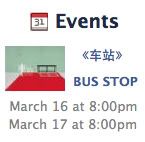
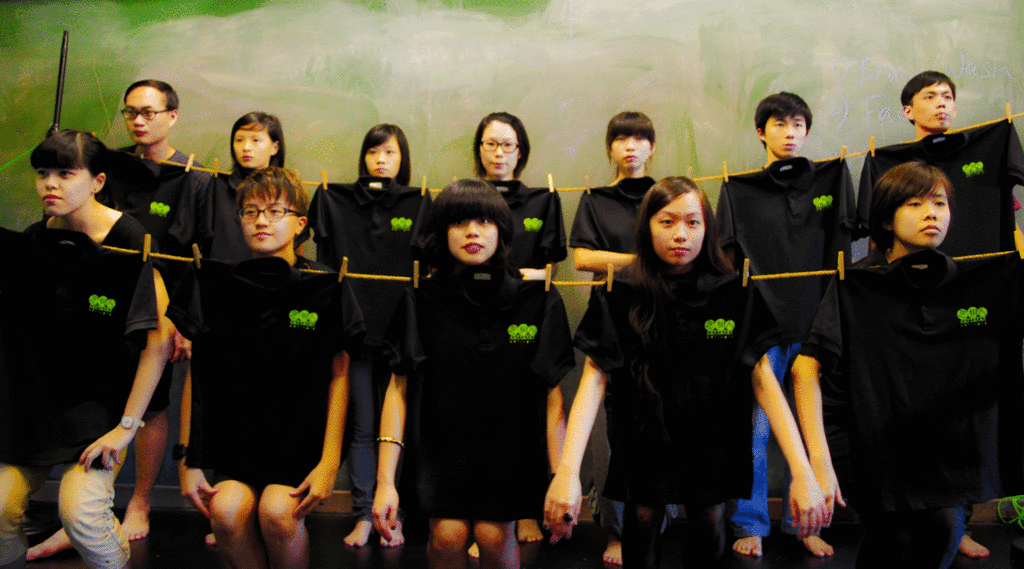
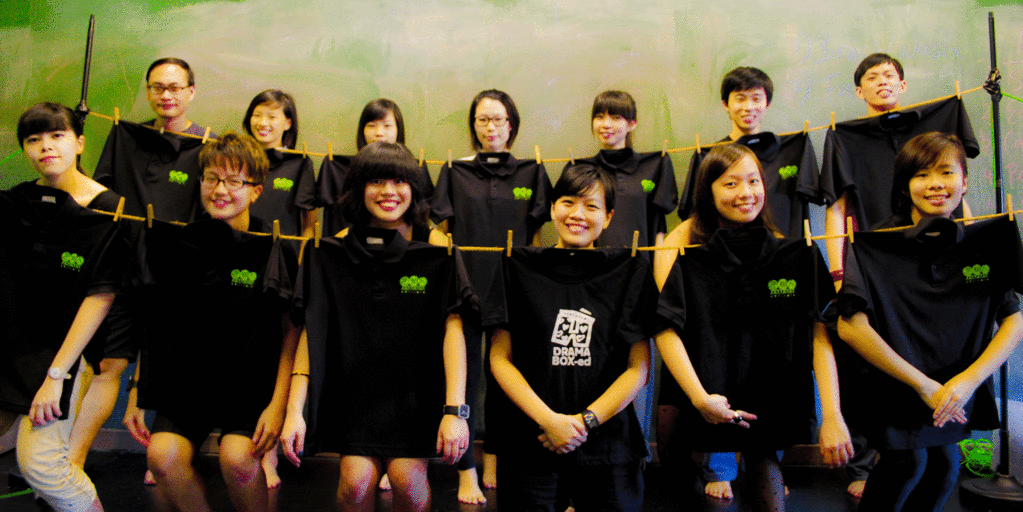
 母性泛滥; 热爱人
母性泛滥; 热爱人 长着翅膀
长着翅膀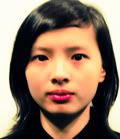 我在南大念心理学科。心理学对我来说,跟戏剧的妙处不相上下。
我在南大念心理学科。心理学对我来说,跟戏剧的妙处不相上下。 就读南洋理工大学。
就读南洋理工大学。 法律系学生。
法律系学生。 正值后青春期的门槛状态。
正值后青春期的门槛状态。 热爱的东西太多,拥有的时间有限。
热爱的东西太多,拥有的时间有限。 在国大读书.
在国大读书. 南大中文系毕业。非常健忘,经常丢三落四。
南大中文系毕业。非常健忘,经常丢三落四。 在2009年毕业于新加坡国立大学的科学系。由于我目前还在学习编剧和导戏的工作,未能有值得一提的代表作。
在2009年毕业于新加坡国立大学的科学系。由于我目前还在学习编剧和导戏的工作,未能有值得一提的代表作。 爱与剧场牵手,与社会学接吻。
爱与剧场牵手,与社会学接吻。 艺树人面试那一天,我告诉许慧铃:"其实我想要做的是电影。"
艺树人面试那一天,我告诉许慧铃:"其实我想要做的是电影。" 